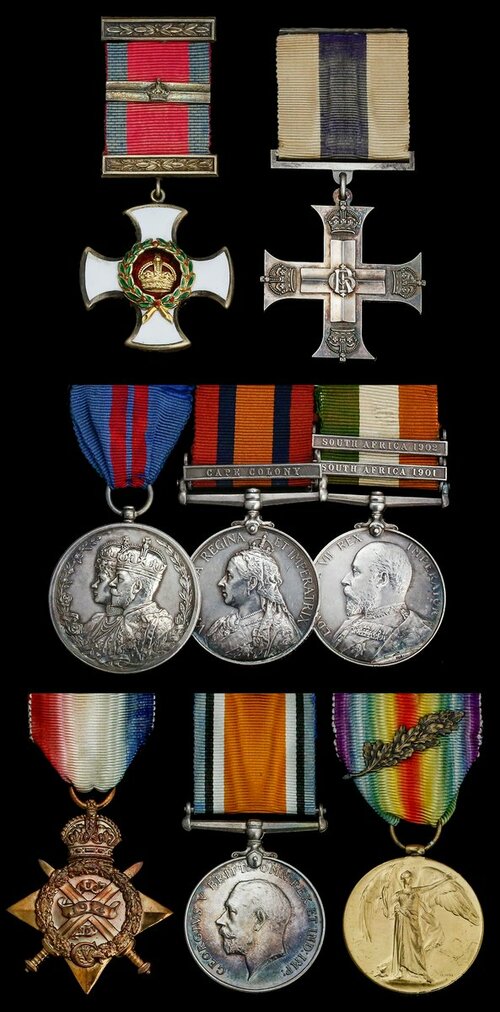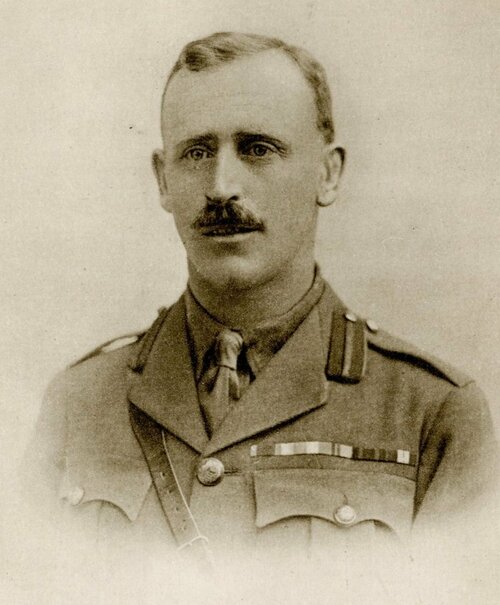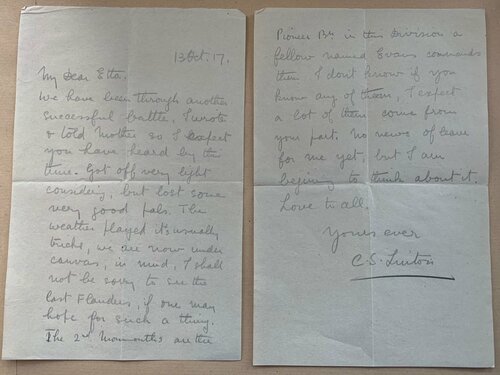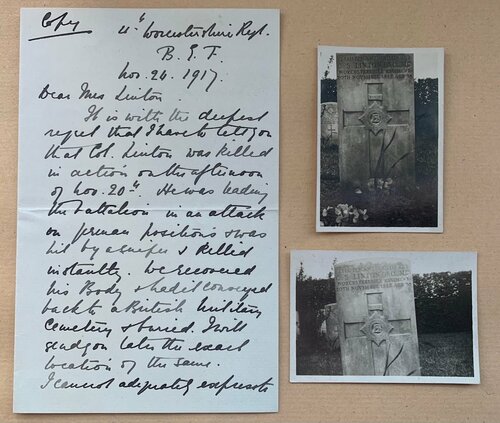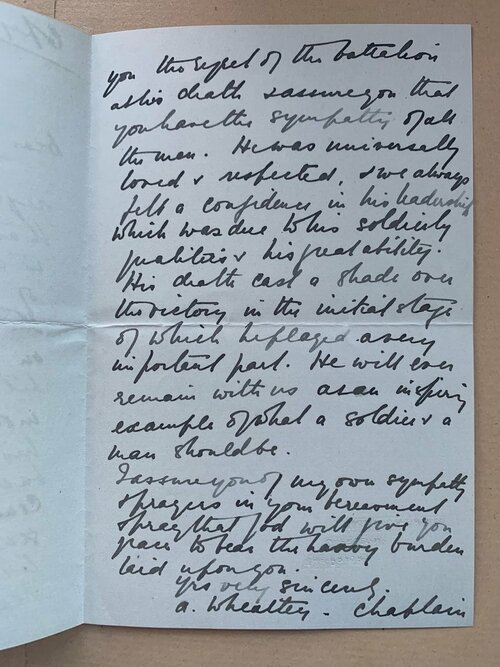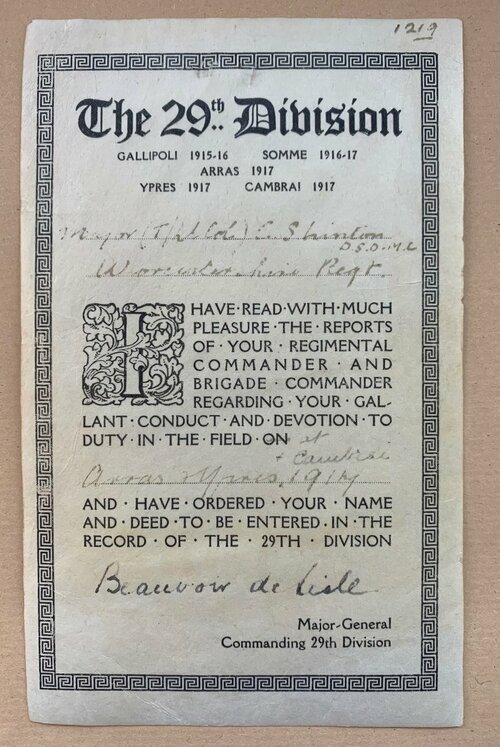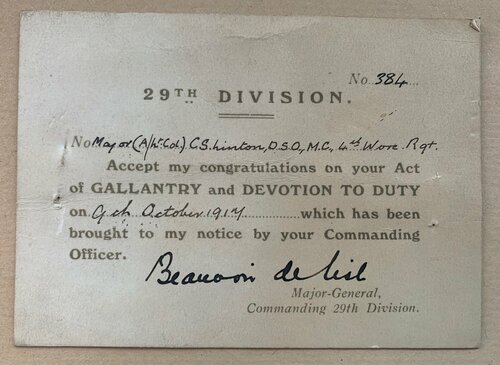Auction: 21001 - Orders, Decorations and Medals (conducted behind closed doors)
Lot: 376
'I have met no finer soldier in my 32 years' experience … He was an absolute 'man' - fearless, chivalrous, the soul of honour, an iron sense of duty and full of human empathy. God bless him still and bring to him perfection in the great beyond.'
A letter of condolence from a fellow officer to Lieutenant-Colonel C. S. Linton's sister, dated 6 January 1918, refers.
'He was universally loved and respected, and we always felt a confidence in his leadership, which was due to his soldierly qualities and great abilities. His death cast a shade over the victory in the initial stage of which he played a very important part. He will ever remain with us as an inspiring example of what a soldier and man should be.'
Another letter of condolence, from the Chaplain of the 4th Battalion, Worcestershire Regiment, refers.
An outstanding Great War D.S.O. and Bar, M.C. group of eight awarded to Lieutenant-Colonel C. S. Linton, Worcestershire Regiment, late Welsh Regiment, who was wounded at Neuve Chapelle in March 1915 and - as C.O. of the 4th Worcestershires - shot dead by a sniper in the battle of Cambrai in November 1917
Distinguished Service Order, G.V.R., with Second Award Bar, silver-gilt and enamel; Military Cross, G.V.R., unnamed as issued; Queen's South Africa 1899-1902, 1 clasp, Cape Colony (Lieut. C. S. Linton, Welsh Regt.); King's South Africa 1901-02, 2 clasps, South Africa 1901, South Africa 1902 (Lt. C. S. Linton, Welsh Rgt.); 1914 Star (Capt. C. S. Linton, Worc. R.); British War and Victory Medals, M.I.D. oak leaf (Lt. Col. C. S. Linton); Delhi Durbar 1911, unnamed as issued, the pre-Great War awards mounted as worn, D.S.O. obverse centre recessed and minor corrosion to reverse of the 1914 Star, contact marks but generally very fine or better (8)
D.S.O. London Gazette 26 June 1916.
Bar to D.S.O. London Gazette 26 November 1917:
'In the initial arrangements for an attack, which resulted in the capture of the first two objectives, as well as during the action and the consolidation after, he displayed marked ability and leadership as well as fearlessness in exposing himself when necessary.'
M.C. London Gazette 23 June 1915.
Charles Strangways Linton was born on 9 August 1881, the third son of Henry Piper and Julia Linton of Llandaff Place, Llandaff, Glamorgan, and was educated at Wayneflete School and Winchester College. His eldest brother, James, was also educated at Winchester. Two other brothers - not Wykehamists - fought in the Great War, one of whom was awarded the D.S.O. for gallant services in the Welsh Regiment and another who was killed in action with the Northamptonshire Regiment.
Young Charles was commissioned in the 3rd Battalion, Welsh Regiment (Militia) as a 2nd Lieutenant in April 1900 and witnessed active service in Cape Colony in South Africa (Queen's Medal & clasp; King's Medal & 2 clasps). In September 1901, he received a commission in the Regular Army with an appointment in the Worcestershire Regiment.
Promoted to Lieutenant in January 1904, he served with the 4th Battalion in Bermuda, Barbados and Malta, and as Adjutant of the Battalion in India the period November 1910 to November 1913. He was advanced to Captain and awarded the Delhi Durbar Medal.
B.E.F. 1914 - 'Retreat to Moscow'; Neuve Chapelle - wounds
Having then transferred to the 1st Battalion, Linton was embarked for Le Havre in the troopship Maidan in the first week of November 1914. He and his comrades endured a difficult winter, for battle casualties aside, the Battalion undertook what its war diary described as 'The Retreat to Moscow', namely a march in late November in which one in every four men was found to be suffering from severe frostbite. By mid-December 1914, no less than 440 ranks were similarly afflicted. The same source states that Christmas Day was 'a strange sensation … the silence seemed unreal.'
Linton was subsequently wounded at Neuve Chapelle on 10 March 1915. On recovering from his wounds - and having been awarded one of the first the M.C.s ever to be gazetted - he was posted to Army H.Q. as a Staff Captain in the Canadian Corps.
He was advanced to Major in May 1916 and was awarded the D.S.O. 'for distinguished service in the field' in the following month. A glimpse of his subsequent services in 1916 is to be found in one of the above quoted letters of condolence:
'He was one of those gallant spirits for whom there could be no other fate. I can't think how he escaped so long. We walked upon the Pozieres Ridge that Sunday and he explained to me all about his fighting there in the autumn of 1916. He was Brigade Major of the 111th Infantry Brigade.'
Battalion C.O. - second D.S.O. - sniper's bullet
In July 1917, Linton took command of the 4th Battalion, Worcestershire Regiment, and gained a Bar to his D.S.O. for his fearless leadership in the battle of Poelcapelle, near the Namur Crossing, on 9 October 1917.
A few days later, on the 13th, Linton referred to the action in a letter to his sister, Etta:
'We have been through another successful battle. I wrote and told mother so I expect you have heard by this time. Got off very light considering, but lost some very good pals. The weather played its usual tricks. We are now under canvas, in mud. I shall not be sorry to see the last of Flanders, if one may hope for such a thing … no news of leave for me yet, but I am beginning to think about it.'
It was not to be.
During the Battle of Cambrai on the 20 November 1917, the leading companies of the 4th Battalion pushed forward rapidly and soon reached their objective, the Lock over the canal, half a mile south-east of Masnieres. They crossed the Lock, seized the trenches beyond it near the Sugar Factory, and quickly consolidated their positions in readiness for counter-attacks. At 2.00 p.m., Linton went forward across the canal to see the situation for himself. On his way back, while crossing the Lock, he was shot dead by a German sniper.
He was 36-years-old.
Gallantry awards aside, Linton had been mentioned in despatches on no less than four occasions (London Gazettes 22 June 1915, 15 June 1916, 15 May 1917 and 18 December 1917, refer).
The gallant Colonel is buried in the Fins New British Cemetery at Sorel-le-Grand.
Postscript
On the 9 April 1918, the War Office forwarded - by registered post - his D.S.O. and Bar, and M.C. to his mother, 'Mrs. Julia Linton of 3, Llandaff Place, Llandaff, S. Wales'; these were followed by the late Colonel's campaign awards in October 1922.
Sold with a quantity of original documentation, including:
(i)
The recipient's commission warrants for the ranks of 2nd Lieutenant in the 3rd Battalion, Welsh Regiment (Militia), and the Worcestershire Regiment, the latter dated 13 September 1901.
(ii)
His D.S.O. warrant in the name of 'Major C. S. Linton, Worcestershire Regiment', dated 3 June 1916, together with a copy of the Order's Statutes.
(iii)
29th Division commendation cards for Arras, April 1917, and the Poelcapelle action on 9 October 1917, both signed by Beauvoir de Lisle, the Major-General Commanding.
(iv)
The above quoted letter to his sister Etta, dated 13 October 1917, together with the quoted letters of condolence from a fellow officer, dated 6 January 1918, and the 4th Battalion's Chaplain, dated 24 November 1917.
(v)
War Office letter to the recipient's father, 'H. P. Linton, Esq. Llandaff Place, Llandaff', dated 31 January 1918, listing details of the recipient's four mentions in despatches - 'I am to express His Majesty's high appreciation of these services, and to add that his Majesty trusts that their public acknowledgment may be of some consolation in your bereavement'; together with War Office forwarding letter for the recipient's D.S.O. and Bar, and M.C., to his mother, 'Mrs. Julia Linton', dated 9 April 1918, and similar for his Great War campaign awards, dated 2 October 1922.
(vi)
Two photographs of the recipient's headstone in the Fins New British Cemetery at Sorel-le-Grand, and one or two related newspaper cuttings.
Subject to 20% VAT on Buyer’s Premium. For more information please view Terms and Conditions for Buyers.
Sold for
£7,000
Starting price
£3800

